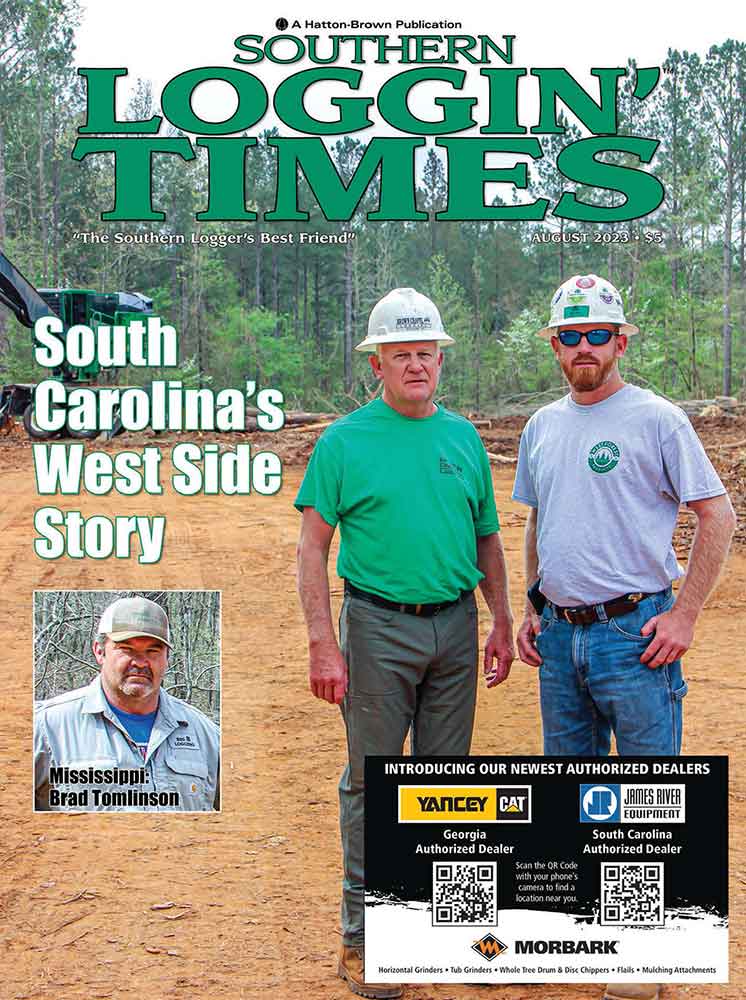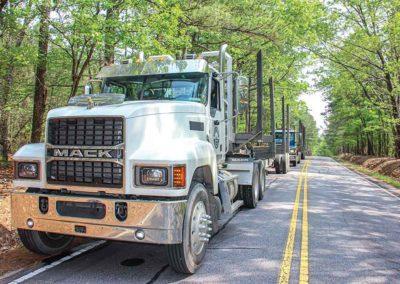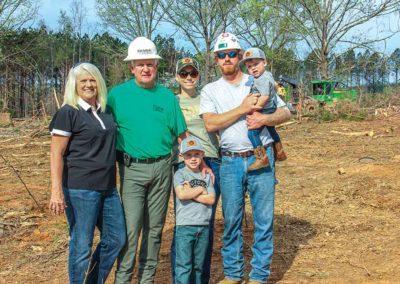August 2023
NEWBERRY, South Carolina – Bud West, 63, and his son Matt, 32, can trace their roots in the timber industry back 100 years, when Bud’s grandfather, Herman “Bull” West, started logging in the mountains of western North Carolina in the 1920s, with a crosscut saw and a yoke of steers. “He skidded with steers and cut hemlock to take to a tannery,” Bud says.
Inside This Issue
COVER: South Carolina's West Side Story
NEWBERRY, South Carolina – Bud West, 63, and his son Matt, 32, can trace their roots in the timber industry back 100 years, when Bud’s grandfather, Herman “Bull” West, started logging in the mountains of western North Carolina in the 1920s, with a crosscut saw and a yoke of steers. “He skidded with steers and cut hemlock to take to a tannery,” Bud says.
Article by David Abbott, Managing Editor, Southern Loggin’ Times
SOUTHERN STUMPIN': Survey Says:
EDITOR’S NOTE: Timber Harvesting, another logging industry magazine from Hatton-Brown Publishing, the parent company of Southern Loggin’ Times, released the 2023 edition of its annual Logger Survey in the July/August issue.
The 2023 Annual Logger Survey Report looks at a “before” and “after” situation comparing business conditions and survey results from 2019, before the pandemic hit in early 2020, to now—a depressing new normal in many ways. Along the way, there have been unprecedented forest products prices, soaring inflation, pandemic dynamics leading to labor issues and much more.
Article by David Abbott, Managing Editor, Southern Loggin’ Times
Working Man
MABEN, Mississippi – The company is called Big B Logging, but owner Brad Tomlinson, 50, swears he never meant for it to get quite this big. “I just wanted it to be small: one cutter, one skidder, one loader,” Tomlinson says. Instead, he’s fielding two whole crews.
Article by David Abbott, Managing Editor, Southern Loggin’ Times
BULLETIN BOARD
Our Best Leisure Selections From Our Not-So-Sharp Minds
INDUSTRY NEWS ROUNDUP
- Dale Greene Retires As Dean Of UGA Warnell
- Auburn Coach’s Property Donated
- Core Industries Plans Facility For Pellets Handling
- Musser Expands Byproducts Business
- Lucky Branch Tract Finds Some Luck
- Enviva Makes It Official At Epes
South Carolina’s West Side Story
Article by David Abbott, Managing Editor, Southern Loggin’ Times
NEWBERRY, South Carolina – Bud West, 63, and his son Matt, 32, can trace their roots in the timber industry back 100 years, when Bud’s grandfather, Herman “Bull” West, started logging in the mountains of western North Carolina in the 1920s, with a crosscut saw and a yoke of steers. “He skidded with steers and cut hemlock to take to a tannery,” Bud says.
The family business evolved from there. Herman had five sons, all of whom worked in the woods over the years, either in logging or land clearing, and then passed it on to the next generation. Bud went to work in the woods with his own dad, Whitie West, as soon as he was big enough, around age 12.
In those days, logging was seasonal work; the family split time off-and-on between logging and land clearing When Bud started helping his dad in the late ‘70s, they were cutting five-foot pulp and loading with a big stick loader. Back then, in Bud’s youth, the family still worked in that high country terrain of western North Carolina, where they were born and raised; Bud grew up in the little town of Marble, NC. “It’s pure mountains there, big mountains, along the Tennessee/Georgia border,” he says of the region.
In the early-mid 1980s, the family relocated their operations to South Carolina, following the work where they could find it. “We just couldn’t make a living in the mountains,” Bud explains. “We were working down here and driving back and forth on the weekends, so we finally just moved down here.” They planted roots and have been here ever since.
When they came of age, Bud’s three sons (Matt, Travis and Jason) all followed their dad’s example by going to work in the family business right out of high school.
In 2004, Bud went out on his own, not in logging but in clearing power line right-of-ways. He started his own company, West Land Clearing. “When we were clearing there was always timber to get rid of, and we couldn’t get a logger to come pick it up because it was just a small amount here and there,” he says. “So we wound up buying a buncher, then a skidder, then a loader, and the next thing you know we’re in the logging business.” He christened his second company Brown Chapel Logging, LLC, because their shop is located on Brown Chapel Road in Newberry.
Have A Question?
Send Us A Message



